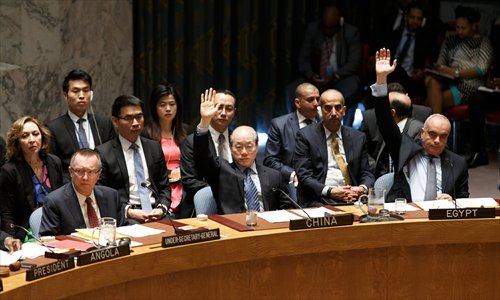UN adopts toughest sanctions on North Korea
China, Russia reach consensus on halting NK nuke, missile programs

The UN Security Council on Wednesday votes to adopt a resolution that aims at expanding the sanctions on North Korea at the UN headquarters in New York City. Photo: Xinhua
The United Nations Security Council on Wednesday unanimously adopted a resolution that dramatically expands existing UN sanctions on North Korea in response to its nuclear tests and rocket launch.
US Ambassador to UN Samantha Power said the new sanctions on Pyongyang go further than any UN sanctions regime in two decades.
Under the new sanctions, all cargo going to and from North Korea must be inspected and North Korean trade representatives in Syria, Iran and Vietnam are among 16 individuals added to a UN blacklist, along with 12 North Korean entities.
Previously states only had to inspect North Korean cargo shipments if they had reasonable grounds to believe they contained illicit goods.
The vote on the draft resolution, which was presented by the US last week after the US and China had reached an agreement, was suspended after Russia called for "a procedural 24-hour review" of the draft.
In a call with his Russian counterpart Sergei Lavrov on Wednesday, Chinese Foreign Minister Wang Yi said "China and Russia has had effective communication about the new UN resolution against North Korea and reached a consensus to stop North Korea from further developing its nuclear and missile programs, prevent wars and unrest in the Korean Peninsula and safeguard the two countries' legitimate interests," according to a post on Chinese foreign ministry's website.
US President Barack Obama on Wednesday said the UN resolution "has sent Pyongyang a simple message: North Korea must abandon these dangerous programs and choose a better path for its people."
Nuclear tests and the rocket launch have frayed relations between China and North Korea.
Conventionally, the Korean Peninsula was often regarded as a strategic buffer zone, but its strategic significance is dwindling due to the evolution of modern warfare, Dong Xiangrong, a research fellow at the National Institute of International Strategy of the Chinese Academy of Social Sciences, told the Global Times.
"Taking into account the harm caused by North Korea's nuclear and missile tests to regions surrounding China, the value of such strategic assets now seems debatable," Dong said.
Experts said China increasingly tends to view its relations with North Korea from the perspective of national interests rather than just ideology.
"A nuclearized North Korea does not serve the national interests of China," Dong said, noting that the country's actions have cost much of China's diplomatic resources, which were used in exchange for stability in Northeast Asia.
Increasingly threatening
South Korea's foreign minister on Wednesday called on the UN Security Council to expand sanctions on North Korea to punish what he called an escalating and increasingly threatening nuclear program.
In response, So Se-pyong, North Korean ambassador to the UN in Geneva, said North Korea does not seek to use its nuclear weapons against South Korea but needs to maintain its nuclear deterrent to ensure stability of the peninsula in the face of "hostile" US policies.
Tensions on the Korean Peninsula have been on the rise after North Korea's rocket launch last month. The South Korean government said it was entering talks with the US regarding the deployment of the Terminal High-Altitude Area Defense system, a move firmly opposed by China.
"The rocket launch has escalated tensions in the regions surrounding China. To maintain stability, we should push for denuclearization of the Korean Peninsula," Da Zhigang, director of the Institute of Northeast Asian Studies, the Heilongjiang Provincial Academy of Social Sciences, told the Global Times on Wednesday, adding that the sanctions indicate that China is trying to adjust its policy toward North Korea.
Reuters contributed to this story